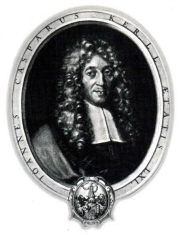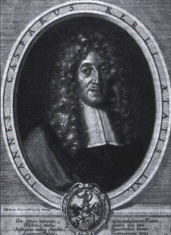|
|
Johann Kaspar Kerll (Composer) |
|
Born: April 9, 1627 - Adorf, Vogtland, Saxony, Germany
Died: February 13, 1693 - Munich, Bavaria, Germany |
|
Johann Kaspar [Caspar] Kerll was a German baroque composer and organist. Even though he was one of the most acclaimed composers of his time, known both as an gifted composer and an outstanding teacher, Kerll is virtually forgotten today and his music is rarely played or recorded. |
|
Life |
|
Johann Kaspar Kerll was the son of Caspar Kerll and Catharina Hendel, who got married in 1626. As a child, Kerll probably received musical training from his father, who was the organist of Michaeliskirche in Adorf (employed after he, together with Jacob Schädlich, had built a new organ for that church). Little is known about his childhood and youth. Apparently after he demonstrated exceptional musical abilities, Kerll was given an opportunity to study music under Giovanni Valentini, court Kapellmeister in Vienna. He spent several years in Vienna, studying and working as a court organist, then moved to Rome, where he became a pupil of Giacomo Carissimi. It is very likely that during his stay in Rome (around 1648-1649) Kerll studied with Johann Jakob Froberger, who was living in the city at the time, but no firm evidence was found to prove this.
In approximately 1646-1647 Archduke Leopold Wilhelm of Austria, by then the governor of the Spanish Netherlands, appointed Johann Kaspar Kerl as a chamber organist for the new residental palace in Brussels. For some reason he was able to leave Brussels time and again without losing his job: he travelled to Rome in 1648 to study under Carissimi; together with Froberger he visited Dresden in the winter of 1649-1650 and attended the wedding of Philip IV of Spain and Marie-Anne of Austria; in 1651 Leopold Wilhelm had to order him back from Vienna, yet in 1652 he visited Vienna again, spent some time in Göttweig and travelled to Moravia.
In 1655 the Brusseles court broke up and in February 1656 Johann Kaspar Kerl accepted a temporary post of Vice-Kappelmeister at the Munich court, Elector Ferdinand Maria was his employer. In March the job became permanent, and in September Kerll became Court Kappelmeinster at Munich. His new duties included composing religious music for church services, chamber music and opera for the court. While in Munich, in 1657 Kerll married Anna Catharina Egermayer. The couple had eight children, but only one of them, the youngest son, pursued a career in music. Kerll gave up his post in Munich in 1673 for unclear reasons (there were rumors about him quarreling with other court musicians, bad discipline in the court, etc). He would, however, maintain contact with Elector Ferdinand Maria until his death.
Kerll moved to Vienna in 1674 and was appointed as court organist in 1675. It is possible that he was working at the Saint Stephen Cathedral and that Johann Pachelbel was his deputy organist there. Anna Catharina died in 1679 from plague and he married his second wife Kunigunde Hilaris in 1682 (possibly 1683). Kerll stayed in Vienna for almost 10 years after that, visiting Munich several times between 1684 and 1692. At the end of 1692 he relinquished his position, left Vienna and returned to Munich, where he died shortly afterwards. |
|
Works |
|
Johann Kaspar Kerll had a lot in common with Muffat and Froberger: they were all Southern German composers trained in Italy. Italian influence is easily traced in his pieces, and much of his keyboard music makes use of Froberger's and Girolamo Frescobaldi's techniques.
Most of Kerll's keyboard works are meant to be played on organ or harpsichord. The exceptions are four dance suites composed for harpsichord, and two toccatas from a set of eight toccatas organized by Church Modes: Toccata quarta Cromatica con Durezze e Ligature and Toccata sesta per il pedali, both meant to be played on organ. Kerll's other surviving keyboard music includes a number of canzonas, probably composed for educational purposes, liturgical Magnificat cycles and several standalone works: Ricercata in Cylindrum phonotacticum transferanda, Chaconne in C major, Passacaglia in D minor and Capriccio Sopra’ il Cucu.
Kerll wrote masses, requiems and Magnificats, sometimes for two or three choruses, frequently using concertato techniques. For his non-keyboard music, the years in Munich were especially productive: he revived the court chapel ensemble of the Munich court and composed a wealth of vocal and chamber music. His first opera, Oronte, was composed in Munich in 1657. Unfortunately, many of these pieces either are lost (for instance, no opera of Kerll's survived) or remain unpublished. Out of his vocal music, only 13 masses and 2 requiems have survived. |
|
Influence |
|
Johann Kaspar Kerll was highly regarded by his contemporaries: many of his works were published during his lifetime (particularily in Delectus sacrarum cantionum, a collection of motets and sacred concertos, 1669 and Modulatio organica super Magnificat octo ecclesiaticis tonis respondens, liturgical organ music, 1686). He was a renowned teacher and his pupils included Agostino Steffani and possibly Johann Joseph Fux.
Both J.S. Bach and George Frideric Handel studied J.K. Kerll's work. |
|
J.S. Bach Connection |
|
While organist of St Stphen's Cathedral in Vienna, Johann Kaspar Kerll was assisted by Johann Pachelbel, who studied J.K. Kerll's style and many of his works show his influence. J.K. Kerll thus belongs to the pedagogic tradition leading to J.S. Bach via the latter's elder brother and teacher Johann Christoph Bach [22] (1671-1721), a pupil of J. Pachelbel. J.K. Kerll is one of the 'masters' included in the music book that J.S. Bach secretly copied at his brother's house in Ohrdruf (according to the Obituary), and Carl Philipp Emanuel Bach listed J.K. Kerll as one of the composers whom J.S. Bach esteemed highly. J.S. Bach even reworked the Sanctus part (listed in BWV list as Sanctus in E major, BWV 241) from J.K. Kerll's Missa Superba (8vv) in 1747 and performed the complete work in Leipzig 1747-1748. |
|


|
|
Source: Wikipedia Website; Malcom Boyd, editor: Oxford Composer Companion J.S. Bach (Oxford University Press, 1999, Article author: John Butt)
Contributed by Aryeh Oron (December 2005, November 2008), Teri Noel Towe (Portrait) |
|
Works previously attributed to J.S. Bach |
|
Sanctus in D major, BWV 241 [arranged by J.S. Bach] |
|
Works performed by J.S. Bach |
|
Missa Superba with Sanctus in E major (8vv), BWV 241 - performed by J.S. Bach in Leipzig 1747-1748 |
|
Use of Chorale Melodies in his works |
|
Wie der Hirsch schreiet nach frischem Wasser , Jesu, meine Freude, Herr, wenn ich dich nur habe for Soprano, 2 Violins and bc (CM: Jesu, meine Freude) |
|
Links to other Sites |
|
Johann Kaspar Kerll - Biography (AMG)
HOASM: Johann Kaspar Kerll
Kerll, Johann Kaspar: Biography (Sojurn)
Johann Kaspar Kerll (1627 - 1693) (Karadar) [German]
Johann Kaspar Kerll (Wikipedia)
KERLL, Johann Kaspar (BBKL) [German]
Oehmsclassics: Kelemen, Joseph - Johann Kaspar Kerll: Complete Organ Works
Castle Classics Kerll, Johann Kaspar (German 1627-1693)
Johann Caspar von Kerll (Encyclopædia Britannica) |
|
Bibliography |
|
Johann Mattheson: Johann Mattheson's Der Vollkommene Capellmeister: A Revised Translation with Critical Commentary, Theosophical Classics Series, UMI Research Press (January, 1981)
Rampe, Siegbert, Rockstroh, Andreas: 'Johann Kaspar Kerll', The New Grove Dictionary of Music and Musicians.
Walther, Johann Gottfried: Musicalisches Lexicon oder Musicalische Bibliothec. Neusatz des Textes und der Noten, Bärenreiter (June 1, 2001) |
|
|